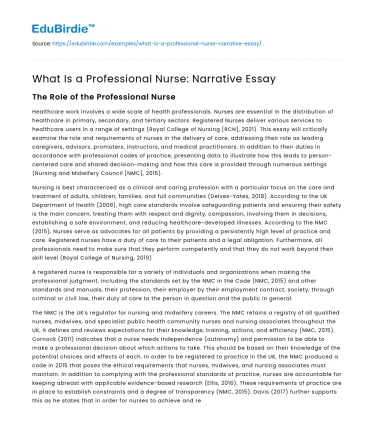The Role of the Professional Nurse
Healthcare work involves a wide scale of health professionals. Nurses are essential in the distribution of healthcare in primary, secondary, and tertiary sectors. Registered Nurses deliver various services to healthcare users in a range of settings (Royal College of Nursing [RCN], 2021). This essay will critically examine the role and requirements of nurses in the delivery of care, addressing their role as leading caregivers, advisors, promoters, instructors, and medical practitioners. In addition to their duties in accordance with professional codes of practice, presenting data to illustrate how this leads to person-centered care and shared decision-making and how this care is provided through numerous settings (Nursing and Midwifery Council [NMC], 2015).
Nursing is best characterized as a clinical and caring profession with a particular focus on the care and treatment of adults, children, families, and full communities (Delves-Yates, 2018). According to the UK Department of Health (2008), high care standards involve safeguarding patients and ensuring their safety is the main concern, treating them with respect and dignity, compassion, involving them in decisions, establishing a safe environment, and reducing healthcare-developed illnesses. According to the NMC (2015), Nurses serve as advocates for all patients by providing a persistently high level of practice and care. Registered nurses have a duty of care to their patients and a legal obligation. Furthermore, all professionals need to make sure that they perform competently and that they do not work beyond their skill level (Royal College of Nursing, 2019)
Save your time!
We can take care of your essay
- Proper editing and formatting
- Free revision, title page, and bibliography
- Flexible prices and money-back guarantee
A registered nurse is responsible for a variety of individuals and organizations when making the professional judgment, including the standards set by the NMC in the Code (NMC, 2015) and other standards and manuals, their profession, their employer by their employment contract, society, through criminal or civil law, their duty of care to the person in question and the public in general.
The NMC is the UK's regulator for nursing and midwifery careers. The NMC retains a registry of all qualified nurses, midwives, and specialist public health community nurses and nursing associates throughout the UK, it defines and reviews expectations for their knowledge, training, actions, and efficiency (NMC, 2015). Cornock (2011) indicates that a nurse needs independence (autonomy) and permission to be able to make a professional decision about which actions to take. This should be based on their knowledge of the potential choices and effects of each. In order to be registered to practice in the UK, the NMC produced a code in 2015 that poses the ethical requirements that nurses, midwives, and nursing associates must maintain. In addition to complying with the professional standards of practice, nurses are accountable for keeping abreast with applicable evidence-based research (Ellis, 2016). These requirements of practice are in place to establish constraints and a degree of transparency (NMC, 2015). Davis (2017) further supports this as he states that in order for nurses to achieve and retain the skills required to provide outstanding treatment for patients, continuous professional expertise requires active involvement, this will include different elements, such as ethics, integrity, confidentiality, transparency, and how to apply facts in a representative situation (Avery, 2016).
In order to help a patient, develop their own health and well-being, any interaction or meeting a nurse has with them is a crucial opportunity (West, 2019). Continuing from this, West (2019) states that role modeling and supporting people with the experience, awareness, and future tools to make decisions about their lifestyles, however, by enhancing public health awareness and encouraging individuals to make healthy decisions for themselves, nurses will play their part in changing communities for the better. In May 2018, the NMC published an updated edition of the future nurse standards, which included 'promoting health and preventing ill health' as one of the seven platforms, emphasizing how important this is. The future nurse requirements must be met by any nurse to enroll (and stay on) the nursing register (NMC, 2015). The future Nurse standards also state that in delivering, directing, and organizing treatment that is humane, evidence-based, and person-centered, registered nurses play a critical role. They are responsible for their own actions and must be able to perform independently or as an equal with a variety of other experts and in interdisciplinary teams (NMC, 2015). Within interdisciplinary teams that produce person-centered systems, nurses play a vital role.






 Stuck on your essay?
Stuck on your essay?

